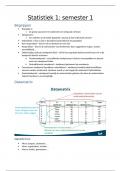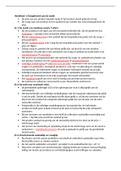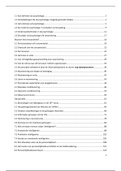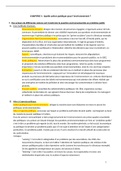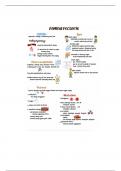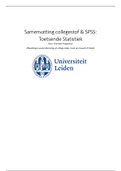Chapter 8 Supplier Quality Management
8.2 Overview of Supplier Quality Management
8.2a What Is Supplier Quality?
Quality: the total composite of product and service characteristics of marketing,
engineering, manufacturing, and maintenance through which the product or service in use
will meet or exceed the expectations of the customer.
Supplier quality: the ability to meet or exceed current and future customer expectations or
requirements within critical performance areas on a consistent basis.
Supplier quality performance requires that a buyer learns how to become a preferred customer by
understanding and adapting to what suppliers need, expect, and appreciate in the modern buyer-
seller relationship.
8.2b Why Be Concerned with Supplier Quality?
Any buying firm that does not effectively and consistently manage quality throughout its supply
chain is risking long-term customer dissatisfaction, lower profitability, reduced market share, and
increased costs, as well as potentially negative public relations.
Supplier Impact on Quality
A firm that focuses only on its own internal quality issues will usually fail to recognize and take
appropriate action on the true underlying root causes of many of its quality-related problems. Poor
supplier quality performance can quickly undermine a firm’s total quality improvement effort.
Continuous-Improvement Requirements
One way to achieve continuous quality improvements in all aspects of a business is through
proactive management of supplier quality. Quality improvement requirements are a function of a
company’s industry along with how well its performance compares vis-à-vis its competitors.
Outsourcing of Purchase Requirements
It is no longer a competitive advantage in some industries for firms to make most of the components
of a product or to provide their own services. The larger the proportion of the final product that a
supply base provides, the greater the impact it will have on overall product cost and quality.
8.3 Factors Affecting Supply Management’s Role in Managing
Supplier Quality
A number of factors influence how much attention supply management should commit to managing
supplier quality:
- The ability of a supplier to affect a buyer’s total quality.
- The internal resources available to support on-going supplier quality management and
improvement.
- The ability of a buying firm to practice world-class quality.
- A supplier’s willingness to work jointly to improve quality.
- A supplier’s current quality levels.
- A buyer’s ability to collect and analyze quality-related data.
1
, 8.4 Supplier Quality Management Using a Total Quality Management
Perspective
Supply management professionals at all levels must fully understand and commit themselves to the
principles of total quality management (TQM) if they expect to create upstream value in the supply
chain that benefits downstream customers.
Key principles of TQM:
1. Define quality in terms of customers and their requirements.
2. Pursue quality at the source.
3. Stress objective rather than subjective analysis.
4. Emphasize prevention rather than detection of defects.
5. Focus on process rather than output.
6. Strive for zero defects.
7. Establish continuous improvement as a way of life.
8. Make quality everyone’s responsibility.
8.4a Defining Quality in Terms of Customers and Their Requirements
Incomplete or inaccurate development and communication of product specifications has a
disproportionate effect on supplier quality.
Many of the quality problems originating between customer and supplier are caused by poor
product and performance specifications, for which the buying company is largely responsible. The
first cure for poor supplier quality is to eliminate the tyranny of capricious specifications.
Developing a clear understanding of expectations and actual requirements has two dimensions:
1. The ability of the buyer to succinctly identify, define, quantify, or specify its technical and
sourcing requirements.
2. The buyer’s ability to effectively communicate these requirements to suppliers, including
change orders, which means that both parties fully understand the requirements and
processes to be used in modifying them over time.
8.4b Deming’s 14 Points
Deming’s quality philosophy dictates that all 14 points are complementary and equally necessary to
successfully implement a TQM culture in an organization.
Unique features of Deming’s philosophy:
- Variation is the primary source of quality nonperformance.
- To reduce variation, the search for improved quality is a never-ending cycle of design,
production, and delivery, followed by surveying customers – then starting all over again.
- Although quality is everyone’s responsibility, senior management has the ultimate
responsibility for quality improvement.
- Interacting parts of a system must be managed together as a whole, not separately.
- Psychology helps managers understand their employees and customers, as well as
interactions between people.
- Intrinsic motivation is more powerful than extrinsic motivation.
- Predictions must be grounded in theory that helps to understand cause-and-effect
relationships.
Deming’s 14 points:
2
8.2 Overview of Supplier Quality Management
8.2a What Is Supplier Quality?
Quality: the total composite of product and service characteristics of marketing,
engineering, manufacturing, and maintenance through which the product or service in use
will meet or exceed the expectations of the customer.
Supplier quality: the ability to meet or exceed current and future customer expectations or
requirements within critical performance areas on a consistent basis.
Supplier quality performance requires that a buyer learns how to become a preferred customer by
understanding and adapting to what suppliers need, expect, and appreciate in the modern buyer-
seller relationship.
8.2b Why Be Concerned with Supplier Quality?
Any buying firm that does not effectively and consistently manage quality throughout its supply
chain is risking long-term customer dissatisfaction, lower profitability, reduced market share, and
increased costs, as well as potentially negative public relations.
Supplier Impact on Quality
A firm that focuses only on its own internal quality issues will usually fail to recognize and take
appropriate action on the true underlying root causes of many of its quality-related problems. Poor
supplier quality performance can quickly undermine a firm’s total quality improvement effort.
Continuous-Improvement Requirements
One way to achieve continuous quality improvements in all aspects of a business is through
proactive management of supplier quality. Quality improvement requirements are a function of a
company’s industry along with how well its performance compares vis-à-vis its competitors.
Outsourcing of Purchase Requirements
It is no longer a competitive advantage in some industries for firms to make most of the components
of a product or to provide their own services. The larger the proportion of the final product that a
supply base provides, the greater the impact it will have on overall product cost and quality.
8.3 Factors Affecting Supply Management’s Role in Managing
Supplier Quality
A number of factors influence how much attention supply management should commit to managing
supplier quality:
- The ability of a supplier to affect a buyer’s total quality.
- The internal resources available to support on-going supplier quality management and
improvement.
- The ability of a buying firm to practice world-class quality.
- A supplier’s willingness to work jointly to improve quality.
- A supplier’s current quality levels.
- A buyer’s ability to collect and analyze quality-related data.
1
, 8.4 Supplier Quality Management Using a Total Quality Management
Perspective
Supply management professionals at all levels must fully understand and commit themselves to the
principles of total quality management (TQM) if they expect to create upstream value in the supply
chain that benefits downstream customers.
Key principles of TQM:
1. Define quality in terms of customers and their requirements.
2. Pursue quality at the source.
3. Stress objective rather than subjective analysis.
4. Emphasize prevention rather than detection of defects.
5. Focus on process rather than output.
6. Strive for zero defects.
7. Establish continuous improvement as a way of life.
8. Make quality everyone’s responsibility.
8.4a Defining Quality in Terms of Customers and Their Requirements
Incomplete or inaccurate development and communication of product specifications has a
disproportionate effect on supplier quality.
Many of the quality problems originating between customer and supplier are caused by poor
product and performance specifications, for which the buying company is largely responsible. The
first cure for poor supplier quality is to eliminate the tyranny of capricious specifications.
Developing a clear understanding of expectations and actual requirements has two dimensions:
1. The ability of the buyer to succinctly identify, define, quantify, or specify its technical and
sourcing requirements.
2. The buyer’s ability to effectively communicate these requirements to suppliers, including
change orders, which means that both parties fully understand the requirements and
processes to be used in modifying them over time.
8.4b Deming’s 14 Points
Deming’s quality philosophy dictates that all 14 points are complementary and equally necessary to
successfully implement a TQM culture in an organization.
Unique features of Deming’s philosophy:
- Variation is the primary source of quality nonperformance.
- To reduce variation, the search for improved quality is a never-ending cycle of design,
production, and delivery, followed by surveying customers – then starting all over again.
- Although quality is everyone’s responsibility, senior management has the ultimate
responsibility for quality improvement.
- Interacting parts of a system must be managed together as a whole, not separately.
- Psychology helps managers understand their employees and customers, as well as
interactions between people.
- Intrinsic motivation is more powerful than extrinsic motivation.
- Predictions must be grounded in theory that helps to understand cause-and-effect
relationships.
Deming’s 14 points:
2



